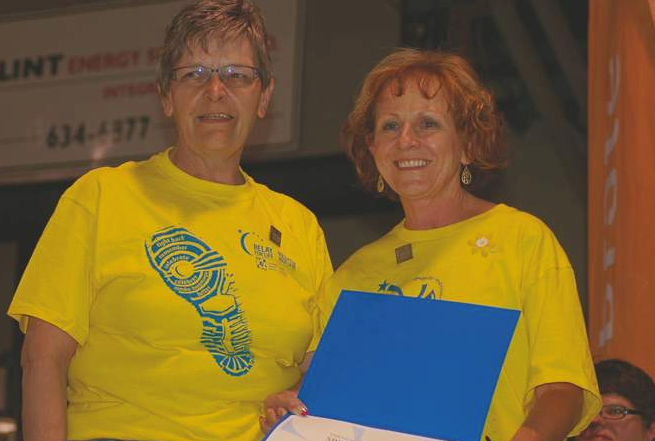It's a diagnosis that carries a lot of baggage and a lot of preconception, not all of which is necessarily accurate. When someone is diagnosed with cancer, connecting with a peer can be a great way to learn what is ahead from someone who has been there and done that, adding a layer of connection that can be difficult to attain from a doctor explaining the medical ins and outs of the disease.
Estevan's Carol Cundall, who is now a peer support trainer with the Canadian Cancer Society, was diagnosed with Stage 4 breast cancer.
She spoke with the Mercury last week about the benefits of the peer support system and how speaking to someone who has experienced those emotions, and felt the pain they may expect following their diagnosis and through their treatment, can help get one through treatment.
"The reality is when you're diagnosed with cancer, it's really nice to be connected with someone who has the same diagnosis that you do," said Cundall, who noted the matching process that connects newly diagnosed patients and peers is very involved.
She said all peers undergo a questionnaire for suitability, and she noted peers are supposed to be cancer free for at least a year. She noted however, that she deals with people who have Stage 4, and she said "you're never cancer free with that kind of a diagnosis."
"My case is a little bit more unique with the people I'm calling because they all have a Stage 4 diagnosis and the cancer has spread. A Stage 4 diagnosis means you have metastatic cancer, so I'm talking to people with metastatic breast cancer. They were all given a really awful diagnosis, and that's frightening.
"I remember in the hospital, thinking I just wanted to talk with someone with my diagnosis who is still alive. And that's what I can give them," said Cundall.
The peer support program is a free service offered through the Canadian Cancer Society, and has allowed Cundall to connect with other women with her diagnosis all over the country.
"What is nice is you can be yourself," she said. "I think when you have cancer you try to be strong for your family, for your children, for your friends, and you don't let some of your fears out. With this person, it's a phone call and you can, because you know they know what's going on."
She said peers communicate over the phone, and it's up to the patient how much time they wish to spend speaking with a peer.
"Sometimes this is a one-time call. Sometimes it's ongoing. Sometimes they just want to know that you're still OK. They think, 'well if you're OK, I'm going to be OK too.'"
Often, people want to know what they should do and who should be there with them.
"Writing things down helps. When you're going to see your oncologist, by this time you usually know you have cancer, but then when you're told it's not good news, your mind just leaves you, and that's all you remember. You need somebody with you to ask some of those questions, and sometimes your partner is not the best choice because they're in as much shock as you are," noted Cundall, who advises people to think carefully about who they would want there with them during that conversation.
"It's about sharing your fears, and it's OK to be afraid. When you've been given a metastatic diagnosis, your head always goes to your funeral," said Cundall, who added, "That gets a little old. You've got to quit your mind going there. Everyone I talk to, that was the reaction. We all started thinking about our funerals and obituaries. But we're not dead yet. Let's keep living and being as strong and positive as we can be."
Though she is a peer to many women who have a diagnosis that doesn't provide much hope, she said she enjoys being the hopeful example for these women, and doesn't plan on ceasing her peer support activities.
"I know what they're feeling. I was there. You don't want to tell your spouse you're thinking funeral thoughts. You don't want your children upset when you hear a sad song and you burst into tears. Well, you can tell me because I know what that felt like," said Cundall. "We all did that. We all thought about how everyone is going to miss us, well stop. Think about it. You're not going to be there, so let's not do this to ourselves."
She said having a peer to talk to allows people to air thoughts and feelings they just don't feel they can share with anyone else.
"Talking about things you don't share with others, like the impact on family. If they have children, the impact on the children and how their lives change because their parent has been dealt a diagnosis that's considered terminal."
She said she tries to help get people's minds to a more positive space and to think about the good things that are happening.
"I'll say 'how is today? How are you feeling today?'"
Cundall would like to continue her role with the Cancer Society, though for the peer program, the organization prefers to move people out after they are a certain amount of time removed from their treatment. Because of Cundall's Stage 4 diagnosis, she has been allowed to continue longer.
"I always come away from it with more than I've given, I feel," she said, adding that she will stop when she is no longer the right person to be the eager ear and the wise peer.




